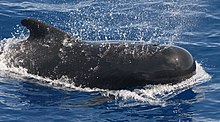Pilot Whales
| Pilot whales | |
|---|---|
 |
|
 |
|
| Size of short-finned pilot whale compared to an average human | |
| Scientific classification | |
| Kingdom: | Animalia |
| Phylum: | Chordata |
| Class: | Mammalia |
| Order: | Artiodactyla |
| Infraorder: | Cetacea |
| Family: | Delphinidae |
| Genus: |
Globicephala Lesson, 1828 |
| Species | |
 |
|
| Green: long-finned range; blue: short-finned | |
Globicephala macrorhynchus
Globicephala melas
Pilot whales are cetaceans belonging to the genus Globicephala. The two extant species are the long-finned pilot whale (G. melas) and the short-finned pilot whale (G. macrorhynchus). The two are not readily distinguishable at sea, and analysis of the skulls is the best way to distinguish between the species. Between the two species, they range nearly worldwide, with long-finned pilot whales living in colder waters and short-finned pilot whales living in tropical and subtropical waters. Pilot whales are among the largest of the oceanic dolphins, exceeded in size only by the killer whale. They and other large members of the dolphin family are also known as blackfish.
Pilot whales eat squid primarily, and also fish. They are highly social, and studies suggest that both males and females remain in their mother's pod, an unusual trait among mammals, also found in certain killer whale communities. Short-finned pilot whales are one of the few mammal species in which females go through menopause, and post-reproductive females may contribute to the survival of younger members of their pods. Pilot whales are notorious for stranding themselves on beaches, and are among the most common cetacean stranders. Several theories have been proposed to account for this behavior. The conservation status of neither species has been determined, but they are subject to both direct and indirect bycatch in fisheries. Whalers in a few countries continue to hunt pilot whales.
Pilot whales are classified into two species:
The short-finned pilot whale was described, from skeletal materials only, by John Edward Gray in 1846. He presumed from the skeleton that the whale had a large beak. The long-finned pilot whale was first classified by Thomas Stewart Traill in 1809 as Delphinus melas. Its scientific name was eventually changed to Globicephala melaena. Since 1986, the specific name of the long-finned pilot whale was changed to its original form melas. Other species classifications have been proposed but only two have been accepted. There exist geographic forms of short-finned pilot whales off the east coast of Japan, which comprise genetically isolated stocks.
...
Wikipedia
